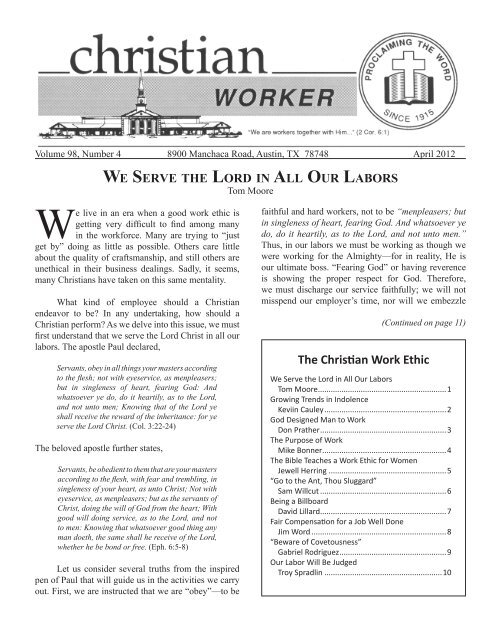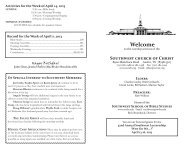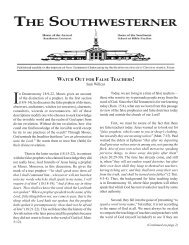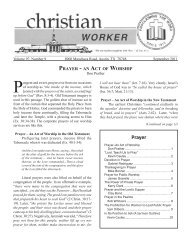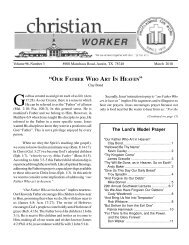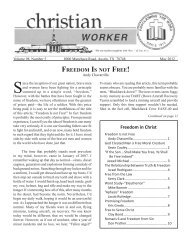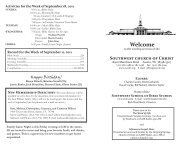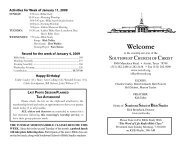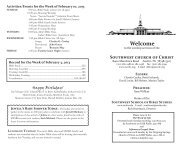Create successful ePaper yourself
Turn your PDF publications into a flip-book with our unique Google optimized e-Paper software.
Volume 98, Number 4 8900 Manchaca Road, Austin, TX 78748 April 20<strong>12</strong><br />
We Serve the Lord in All Our Labors<br />
Tom Moore<br />
We live in an era when a good work ethic is<br />
getting very difficult to find among many<br />
in the workforce. Many are trying to “just<br />
get by” doing as little as possible. Others care little<br />
about the quality <strong>of</strong> craftsmanship, and still others are<br />
unethical in their business dealings. Sadly, it seems,<br />
many <strong>Christ</strong>ians have taken on this same mentality.<br />
What kind <strong>of</strong> employee should a <strong>Christ</strong>ian<br />
endeavor to be In any undertaking, how should a<br />
<strong>Christ</strong>ian perform As we delve into this issue, we must<br />
first understand that we serve the Lord <strong>Christ</strong> in all our<br />
labors. The apostle Paul declared,<br />
Servants, obey in all things your masters according<br />
to the flesh; not with eyeservice, as menpleasers;<br />
but in singleness <strong>of</strong> heart, fearing God: And<br />
whatsoever ye do, do it heartily, as to the Lord,<br />
and not unto men; Knowing that <strong>of</strong> the Lord ye<br />
shall receive the reward <strong>of</strong> the inheritance: for ye<br />
serve the Lord <strong>Christ</strong>. (Col. 3:22-24)<br />
The beloved apostle further states,<br />
Servants, be obedient to them that are your masters<br />
according to the flesh, with fear and trembling, in<br />
singleness <strong>of</strong> your heart, as unto <strong>Christ</strong>; Not with<br />
eyeservice, as menpleasers; but as the servants <strong>of</strong><br />
<strong>Christ</strong>, doing the will <strong>of</strong> God from the heart; With<br />
good will doing service, as to the Lord, and not<br />
to men: Knowing that whatsoever good thing any<br />
man doeth, the same shall he receive <strong>of</strong> the Lord,<br />
whether he be bond or free. (Eph. 6:5-8)<br />
Let us consider several truths from the inspired<br />
pen <strong>of</strong> Paul that will guide us in the activities we carry<br />
out. First, we are instructed that we are “obey”—to be<br />
faithful and hard workers, not to be “menpleasers; but<br />
in singleness <strong>of</strong> heart, fearing God. And whatsoever ye<br />
do, do it heartily, as to the Lord, and not unto men.”<br />
Thus, in our labors we must be working as though we<br />
were working for the Almighty—for in reality, He is<br />
our ultimate boss. “Fearing God” or having reverence<br />
is showing the proper respect for God. Therefore,<br />
we must discharge our service faithfully; we will not<br />
misspend our employer’s time, nor will we embezzle<br />
(Continued on page 11)<br />
The <strong>Christ</strong>ian Work Ethic<br />
We Serve the Lord in All Our Labors<br />
Tom Moore............................................................1<br />
Growing Trends in Indolence<br />
Keviin Cauley..........................................................2<br />
God Designed Man to Work<br />
Don Prather...........................................................3<br />
The Purpose <strong>of</strong> Work<br />
Mike Bonner..........................................................4<br />
The Bible Teaches a Work Ethic for Women<br />
Jewell Herring........................................................5<br />
“Go to the Ant, Thou Sluggard”<br />
Sam Willcut............................................................6<br />
Being a Billboard<br />
David Lillard...........................................................7<br />
Fair Compensation for a Job Well Done<br />
Jim Word................................................................8<br />
“Beware <strong>of</strong> Covetousness”<br />
Gabriel Rodriguez..................................................9<br />
Our Labor Will Be Judged<br />
Troy Spradlin........................................................10
Growing Trends in Indolence<br />
This has ever been the fate <strong>of</strong> energy in security; it<br />
takes to art and to eroticism, and then come languor<br />
and decay.<br />
(H. G. Wells, The Time Machine)<br />
In H. G. Wells book, The Time Machine, he journeys<br />
far into the future to the year 802,701 A.D. He<br />
describes the people he meets in this future world<br />
as indolent, which means habitually lazy, or slothful.<br />
Indolence is a lack <strong>of</strong> activity in one’s life, or an attitude<br />
<strong>of</strong> passivity toward all <strong>of</strong> one’s affairs. As our culture<br />
grows more and more “secure,” Wells, warning rings<br />
true. We are in danger <strong>of</strong> dying the death <strong>of</strong> the apathetic<br />
because some in our society are willing to provide that<br />
for which one must work. The utopian vision <strong>of</strong> “From<br />
each according to his ability, to each according to his<br />
need,” results in “languor and decay.”<br />
We are already beginning to see this trend in<br />
society today. There are those who sit back and permit<br />
the government to provide for them from the cradle to<br />
the grave. Others work just enough to get by so that they<br />
may keep their television set operational; these are then<br />
lulled into lethargy by its luminous display. We hear<br />
stories <strong>of</strong> hoarders who collect old chicken bones in the<br />
bathtub and stack magazines all over the house, leaving<br />
little trails through the clutter to get from one room to<br />
the next. In England, a few years ago, one man became<br />
trapped in his own house as he was crawling through a<br />
tunnel <strong>of</strong> garbage. He died there, and the rescue teams<br />
had to clear out the piles <strong>of</strong> refuse before his corpse could<br />
be recovered. Are these extreme examples Perhaps they<br />
are, but do we not know some that are not so far away<br />
from this<br />
In my own experience, I have had friends express<br />
to me concerns about their adult children (or whom<br />
their children have married) along these lines: “They<br />
are so lazy.” “They sleep late, go to bed early, and sit<br />
around playing video games all day. They don’t want<br />
to get up, go to work, or do anything except sit around,<br />
be entertained, and taken care <strong>of</strong> by others.” The trend<br />
seems to be growing among young men, but concerns <strong>of</strong><br />
young women being just as indolent are also real. Young<br />
men and young women who are not taught in the home<br />
that one must work diligently to be successful in life face<br />
an unforgiving world that will not molly coddle them<br />
when it is time to take out the trash, do the dishes, or<br />
scrub the toilets. Depression ensues when such children<br />
realize they no longer live in the sanitized environment<br />
<strong>of</strong> their parent’s home, and must provide for their own<br />
necessities. Children must be taught early on that there<br />
is no substitute in life for diligent labor.<br />
The Bible makes clear that honorable and<br />
respectable work is an attribute <strong>of</strong> the faithful <strong>Christ</strong>ian.<br />
The apostle Paul commanded, “Let him that stole steal<br />
no more: but rather let him labour, working with his<br />
hands the thing which is good, that he may have to give<br />
to him that needeth” (Eph. 4:28). He exhorted those at<br />
Thessalonica, “And that ye study to be quiet, and to do<br />
your own business, and to work with your own hands, as<br />
we commanded you; That ye may walk honestly toward<br />
them that are without, and that ye may have lack <strong>of</strong><br />
nothing” (1 Thess. 4:11-<strong>12</strong>). He wrote to Timothy, “But<br />
if any provide not for his own, and specially for those<br />
<strong>of</strong> his own house, he hath denied the faith, and is worse<br />
than an infidel” (1 Tim.5:8). The Bible clearly teaches<br />
that we must work to provide for our own needs, and<br />
the needs <strong>of</strong> our own.<br />
This is not selfish as the radicals charge. They<br />
reason that working so as to earn one’s own property is<br />
wasteful and needlessly consumes resources that could<br />
be available to others. The truth is just the opposite. When<br />
we work to provide for ourselves and our families, we are<br />
(Continued on page 3)<br />
CHRISTIAN WORKER<br />
(UPS 109-700)<br />
Third-Class Postage Paid at Manchaca, Texas<br />
Published on a Non-Pr<strong>of</strong>it basis by the<br />
<strong>Southwest</strong> <strong>church</strong> <strong>of</strong> <strong>Christ</strong>, 8900 Manchaca Rd., Austin, TX 78748<br />
http://www.christianworker.us E-mail: <strong>of</strong>fice@swc<strong>of</strong>c.org<br />
Kevin Cauley--------------------------------------------------------- Editor<br />
Editorial Address: 8900 Manchaca Rd., Austin, TX 78748<br />
Single Subscriptions-------------------------------------- $6.00 per year<br />
In Clubs <strong>of</strong> five or more---------------------------------- $5.50 per year<br />
Per family on the Congregation Plan----------------------$5.00 yearly<br />
In a bundle to a congregation or individual-----------------$0.75 each<br />
Foreign (Air Mail postage)------------------------------$17.00 per year<br />
Page 2 CHRISTIAN WORKER April 20<strong>12</strong>
not a burden on society, but provide for our own needs.<br />
Otherwise, someone else would be forced to provide<br />
for us. Forcing another to provide for one who does not<br />
want to work is truly the selfish choice. Indolence should<br />
never be rewarded. Paul said, “For even when we were<br />
with you, this we commanded you, that if any would not<br />
work, neither should he eat” (2 Thess. 3:10). Charity<br />
should be a hand up, not a hand out.<br />
This issue <strong>of</strong> the <strong>Christ</strong>ian Worker concerns itself<br />
with the topic <strong>of</strong> work/labor. In a time when the trend in<br />
the world is to become more indolent, we must redouble<br />
our efforts to be more diligent. To this end, the articles in<br />
this issue seek to address what the Bible teaches about<br />
work/labor, its relationship to the individual <strong>Christ</strong>ian,<br />
and its relationship to the <strong>church</strong>. The <strong>church</strong> may be a<br />
place where the downtrodden come for assistance, but<br />
such assistance is not an end in itself. The goal is to lift<br />
such a one up to the point where he can be self sustaining<br />
to the point that he is then able to assist others who<br />
occupy the place where he once stood.<br />
God Designed Man to Work<br />
Genesis 1:26-27, Genesis 2:15 & Genesis 3:17-19<br />
Don Prather<br />
<strong>CW</strong><br />
Like a frequently used lawn mower, man sputters to<br />
life quickly and runs smoothly with the rhythms<br />
<strong>of</strong> work. Those rhythms include challenges and<br />
satisfactions. We are challenged by long hours spent<br />
at work, by demanding tasks <strong>of</strong> specific jobs, and by a<br />
thousand other frustrations, but we take satisfaction in<br />
jobs well done, in associations with co-workers, and,<br />
<strong>of</strong> course, in pay and benefits. To borrow a phrase from<br />
Paul, work works together for good for those who love<br />
the Lord.<br />
Loving the Lord requires us to respect his ways<br />
(John 14:15, etc.), not only his ways <strong>of</strong> <strong>Christ</strong>ian doctrine<br />
and practice, but also the ways he has built into our<br />
nature. We are “fearfully and wonderfully made” (Psa.<br />
139:14) in our physical capacities and also in our heart,<br />
our soul, and our mind (Matt. 22:37). Who would take<br />
a perfectly good lawn mower and use it as a fan Who<br />
would take human nature, made “in the image <strong>of</strong> God”<br />
(Gen. 1:27), and live defiantly against the character God<br />
gave us, our rich dimensions <strong>of</strong> “heart and mind” (Phil.<br />
4:7) and spirit<br />
Man was made during the hard-working week <strong>of</strong><br />
God’s creative effort, the sixth day to be exact (Gen.<br />
1:24-31). “And on the seventh day God ended his work<br />
which he had made; and he rested” (Gen. 2:2). Made in<br />
his image, we were created to work and rest, with more<br />
<strong>of</strong> the former and less <strong>of</strong> the latter.<br />
Work was man’s role in the Garden. Although<br />
God’s hopes for man’s happiness and his richest blessings<br />
were available everywhere, “the Lord God took the<br />
man, and put him into the Garden <strong>of</strong> Eden to dress it and<br />
to keep it” (Gen. 2:15). Dressing and keeping are chores<br />
<strong>of</strong> tilling and cultivating. “So it seems,” wrote John Gill,<br />
“that man was not to live an idle life.”<br />
“Horticulture, or gardening, is the first kind <strong>of</strong><br />
employment on record... Even in a state <strong>of</strong> innocence<br />
we cannot conceive it possible that man could have been<br />
happy if inactive. God gave him work to do, and his employment<br />
contributed to his happiness; for the structure<br />
<strong>of</strong> his body, as well as <strong>of</strong> his mind” (Adam Clarke).<br />
Matthew Henry further explained the operational<br />
purpose and optimal fulfillment <strong>of</strong> man: “Only he that<br />
made us can make us happy; he that is the Former <strong>of</strong> our<br />
bodies, and the Father <strong>of</strong> our spirits… can fully provide<br />
for the happiness <strong>of</strong> both. Even in paradise man had to<br />
work. None <strong>of</strong> us were sent into the world to be idle.”<br />
Following the Fall, the weight <strong>of</strong> work increased.<br />
“Because thou hast…eaten <strong>of</strong> the tree,” said God,<br />
“cursed is the ground for thy sake; in sorrow shalt thou<br />
eat <strong>of</strong> it all the days <strong>of</strong> thy life…In the sweat <strong>of</strong> thy face<br />
shalt thou eat bread till thou return unto the ground”<br />
(Gen. 3:17-19). By turning away from God’s simple<br />
Garden command, man turned away from great blessings<br />
and turned toward a life <strong>of</strong> greater exertion.<br />
Is work alone the curse, or is the curse defined in<br />
more subtle detail Writing about conditions after The<br />
Fall, William McDonald interestingly observed, “Work<br />
itself is not a curse; it is more <strong>of</strong>ten a blessing. It is the<br />
sorrow, toil, frustration, perspiration, and weariness<br />
connected with work that is the curse.”<br />
(Continued on page 4)<br />
April 20<strong>12</strong><br />
CHRISTIAN WORKER<br />
Page 3
God Designed Man to Work, continued.<br />
No, we were made in the image <strong>of</strong> God to work<br />
and placed in the Garden to work, so work itself cannot<br />
be the curse. The ground received the curse, and just<br />
as woman’s curse was a great increase in the pain <strong>of</strong><br />
childbearing (Gen. 3:16), man’s curse is a great increase<br />
in the difficulties <strong>of</strong> earning a living. Expressing<br />
similar sentiment is Houston’s hard-selling furniture<br />
pitchman “Mattress Mack” McIngvale who <strong>of</strong>ten speaks<br />
motivationally about the importance <strong>of</strong> work saying,<br />
“Work is not our penance or punishment. Work is our<br />
glory and our salvation. Work is life’s greatest therapy.”<br />
Like a lawn mower left too long in the shed, man<br />
chokes and coughs uselessly when he does not work.<br />
Why is man so prone to discontentment, despair, and<br />
disobedience when he is idle We must work in harmony<br />
with God’s intended purpose and our built-in disposition.<br />
Simply stated, God designed man to work and we do<br />
not work very well if we do not work at all.<br />
<strong>CW</strong><br />
The Purpose <strong>of</strong> Work<br />
Mike Bonner<br />
There’s an old adage I remember from childhood:<br />
“A little work never hurts anyone!” This truism<br />
is still worthy <strong>of</strong> our consideration today.<br />
These clichés are bedrock in biblical principles and<br />
commandments from the Old and New Testament.<br />
However, the purpose <strong>of</strong> work has a richer meaning and<br />
really must be well thought-out. Let us take heed and<br />
explore some <strong>of</strong> the purposes <strong>of</strong> work and how it really<br />
is a benefit to all who engage therein!<br />
There’s nothing new about working and toiling.<br />
In the beginning when the Lord God created man, He<br />
placed him in the Garden and commanded him to tend<br />
and keep it (Gen. 2:15). Adam was given responsibilities<br />
to labor, tend, or work and to dress, keep, or protect<br />
the Garden. It is safe to conclude that working teaches<br />
man responsibility. Furthermore, working teaches the<br />
child <strong>of</strong> God <strong>of</strong> his responsibility and duty towards his<br />
fellow man and God. Working gives man confidence<br />
and a will to accomplish a given task. Paul instructed<br />
the Ephesians concerning the obligation <strong>of</strong> laboring,<br />
thus not putting oneself in the position to steal (4:28).<br />
In addition, this would aid him in helping those who are<br />
in need <strong>of</strong> assistance.<br />
So why should we work so hard on a daily basis<br />
for an employer, or even for ourselves Reflect on this<br />
observation: Jesus said clearly to His disciples to seek<br />
first the kingdom <strong>of</strong> God and His righteousness (Matt.<br />
6:33). Considering the context, Jesus instructed them<br />
not to be concerned about the necessities <strong>of</strong> life, for the<br />
Lord will take care <strong>of</strong> them. Now this does not champion<br />
that one can sit around in slothfulness. In seeking first<br />
the kingdom, we must be diligent in our labors so those<br />
who are without may see <strong>Christ</strong> living in us. So many<br />
have bought into the fact that our money belongs to us<br />
alone. However, Paul’s teaching concerning sharing<br />
demonstrates that this could not be the case (1 Tim.<br />
6:17-19). The <strong>Christ</strong>ians at Galatia were exhorted to<br />
share from their labors to those who communicated the<br />
Gospel <strong>of</strong> <strong>Christ</strong> (6:6). So another purpose for working<br />
is to share with others.<br />
When the Lord was providing for Israel, He said<br />
something that should arrest our attention, “For it is<br />
he that giveth thee power to get wealth, that he may<br />
establish his covenant which he sware unto thy fathers,<br />
as it is this day” (Deut. 8:18). God is the One in whom<br />
we live and move and have our very being (Acts<br />
17:28). He is the One who is responsible for giving us<br />
life; therefore, we should strive to give Him glory when<br />
we’re working for our secular masters. <strong>Christ</strong>ians are<br />
responsible for being that employee who is diligent,<br />
self-motivated, and disciplined enough to be left to his<br />
task without micro-management (Col. 3:22). This type<br />
<strong>of</strong> work ethic will bring glory to God, perhaps opening<br />
a door for the Lord to give the increase (1 Cor. 3:5-9).<br />
Even in the midst <strong>of</strong> ill treatment as a worker, the Lord<br />
wants us to hang in there and endure the suffering, for<br />
Peter said this is well-pleasing to God (1 Pet. 2:18-20).<br />
Another great purpose for work!<br />
Unfortunately, there will always be those who are<br />
slothful in their labor. Solomon said, “He also that is<br />
slothful in his work is brother to him that is a great<br />
waster” (Prov. 18:9). This attitude is paramount in the<br />
one who will not take care <strong>of</strong> their physical families<br />
(1 Tim. 5:8). What a great opportunity to show <strong>Christ</strong><br />
(Continued on page 5)<br />
Page 4 CHRISTIAN WORKER April 20<strong>12</strong>
Purpose <strong>of</strong> Work, continued.<br />
living in you by taking care <strong>of</strong> your widowed mother<br />
or grandmother! The Lord has given men the power to<br />
get wealth to take care <strong>of</strong> brethren who have fallen into<br />
difficult times and just need a hand to rebound from<br />
financial despair. John stated very clearly and we dare<br />
not bypass this point, “But whoso hath this world’s<br />
good, and seeth his brother have need, and shutteth<br />
up his bowels <strong>of</strong> compassion from him, how dwelleth<br />
the love <strong>of</strong> God in him” (1 John 3:17). Oh, to exhibit<br />
love and kindness to our brethren in time <strong>of</strong> need! This<br />
is breathtaking, not only to our brethren, but to the<br />
world as well (Gal. 6:10; 2 Cor. 9:<strong>12</strong>-13). What a great<br />
and powerful expression <strong>of</strong> charity, all because <strong>of</strong> the<br />
command to work.<br />
In closing, if an able-bodied individual refuses to<br />
work, the Bible clearly teaches he doesn’t deserve to eat<br />
(2 Thess. 3:10). Consider this adage, “A lazy man will<br />
work when his stomach reaches his back from hunger.”<br />
Let us realize the blessings <strong>of</strong> work. This will afford us<br />
the opportunity to leave something for the grandchildren,<br />
the <strong>church</strong>, or even a worthy cause which helps<br />
and brings God glory.<br />
<strong>CW</strong><br />
The Bible Teaches a<br />
Work Ethic for Women<br />
Jewell Herring<br />
harder. The people on welfare<br />
depend on it,” reads a bumper sticker I<br />
“Work<br />
see every day while walking to my car<br />
after work. Did you know that families who receive cash<br />
assistance and food stamps are on these government<br />
programs anywhere from five months to over seven<br />
years The desire for some women to work has become<br />
archaic since government aid is so readily available and<br />
easy to obtain. Some, such as single women working<br />
and raising children on their own, need the assistance;<br />
however, this article is more focused on those women<br />
who are blessed with good health and the physical<br />
capabilities to work, but refuse to do so.<br />
Since there is a standard that God has set for<br />
women, the characteristics <strong>of</strong> that standard should be the<br />
rule by which a woman is measured. Proverbs 31 tells us<br />
the duties <strong>of</strong> a virtuous woman. One <strong>of</strong> the first duties we<br />
learn about is for a mother to be a teacher: “The words <strong>of</strong><br />
king Lemuel, the prophecy that his mother taught him”<br />
(Prov. 31:1). More specifically, verses 10ff teach us what<br />
a virtuous woman is, implying that anything less than<br />
these characteristics is a woman with either low moral<br />
standards or none at all.<br />
A virtuous woman is a woman who a man can “take<br />
home to meet his mother.” A woman like this is priceless<br />
(v. 10), and her husband knows this, and it is why he<br />
made her his wife; he trusts her to be good to him all<br />
the while they are married (v. <strong>12</strong>). This proverb teaches<br />
women that a virtuous woman is physically capable <strong>of</strong><br />
laboring, does so willingly, and who has talents and<br />
utilizes them for the benefit <strong>of</strong> others inside and outside<br />
<strong>of</strong> her household. Some women today have become so<br />
comfortable with the aid <strong>of</strong> the government that looking<br />
for work, being a help meet for a husband, and being a<br />
spiritual role model for their children is a thing <strong>of</strong> the<br />
past. Verses fifteen and sixteen are important to note. A<br />
virtuous woman is a woman who gets up from her sleep<br />
and works to provide food for her family. This is done by<br />
laboring and earning wages from her work. Her money<br />
does not go to waste on material things, but rather the<br />
funds that she earned through her labor are used to make<br />
sure her household has a home and food to eat.<br />
When we work hard for what we have, we will<br />
not allow anyone else to come in and destroy it by being<br />
careless. We will be more likely to take care <strong>of</strong> our<br />
belongings and make sure our monies are not wasted<br />
on things that do not benefit our families or ourselves.<br />
We will save more rather than spend more. If any <strong>of</strong> us<br />
have known a woman who allows the government to<br />
freely take care <strong>of</strong> her and/or her household, we know<br />
the comfortable life she lives: when the first and fifteenth<br />
<strong>of</strong> the month comes, the bills are paid, and a lot <strong>of</strong> times<br />
there are shopping sprees.<br />
A virtuous woman does not take advantage <strong>of</strong> other<br />
people (Luke 6:28), but has an obligation to work in order<br />
to eat (2 Thess. 3:10). If a man is not in the household<br />
to provide for his own, it is the woman’s responsibility<br />
to do so (1 Tim. 5:8). If a woman cannot work outside<br />
the home, she has something she can do inside the<br />
home. There is always work to be done. A virtuous<br />
woman attends to the needs <strong>of</strong> her household and is not<br />
concerned with everyone else’s personal business (Prov.<br />
31:27). Because <strong>of</strong> the work she does inside the home,<br />
(Continued on page 6)<br />
April 20<strong>12</strong><br />
CHRISTIAN WORKER<br />
Page 5
Work Ethic for Women, continued.<br />
whether it be ironing her husband’s and children’s clothes<br />
for work and school, or helping the needy, she is praised<br />
by her husband and children (Prov. 31:28, 29). They see<br />
her labor, understand the importance <strong>of</strong> it, and reap the<br />
benefits <strong>of</strong> her hard work. A woman like this fears the<br />
Lord because she attends to the responsibilities He has<br />
given her. Her hard work inside the home is known by<br />
those outside her home, and her working hands bring<br />
praise upon her name (Prov. 31:30, 31).<br />
Therefore we should learn from this that it is a sin<br />
to take advantage unneedingly <strong>of</strong> the aid the government<br />
provides to those who truly need it. It is a sin to purposely<br />
avoid work when we are blessed with the physical<br />
abilities and capabilities to do so. It is a sin to be such a<br />
poor example to our children. Poor spiritual leadership<br />
is what we display to our household when we become<br />
lazy in our responsibilities. Work! For your household<br />
depends on it.<br />
<strong>CW</strong><br />
“Go to the Ant, Thou Sluggard”<br />
Sam Willcut<br />
The inspired wise man wrote the following sage<br />
counsel concerning the divine work ethic:<br />
Go to the ant, thou sluggard; consider her ways,<br />
and be wise, which having no guide, overseer<br />
or ruler provideth her meat in the summer and<br />
gathereth her food in the harvest. How long wilt<br />
thou sleep, O sluggard When wilt thou arise out<br />
<strong>of</strong> thy sleep Yet a little sleep, a little slumber, a<br />
little folding <strong>of</strong> the hands to sleep: So shall thy<br />
poverty come as one that travelleth, and thy want<br />
as an armed man. (Prov. 6:6-11)<br />
Such powerful lessons we may learn from such a<br />
tiny creature. Our attitude towards work is the attitude<br />
<strong>of</strong> our philosophy <strong>of</strong> life. Unfortunately, it seems as<br />
if this current generation needs this lesson more than<br />
ever. As a matter <strong>of</strong> fact, the divine principle <strong>of</strong> hard<br />
work is the subject <strong>of</strong> constant emphasis from our past.<br />
In Jamestown, Virginia, John Smith had to apply the<br />
injunction from the apostle Paul, “…if any would not<br />
work, neither should he eat” (2 Thess. 3:10) to get certain<br />
colonial men to work. Isaac Watts wrote the first real<br />
hymnbook in the English language in 1707 and authored<br />
more than six hundred hymns, as well as many books.<br />
In addition to writing the familiar hymns, “Joy to the<br />
World” and “When I Survey the Wondrous Cross,” he<br />
wrote the following moral song:<br />
‘Tis the voice <strong>of</strong> the sluggard; I heard him complain,<br />
“You have waked me too soon, I must slumber again.”<br />
As the door on its hinges, so he on his bed,<br />
Turns his sides and his shoulders and his heavy head.<br />
The concept <strong>of</strong> “rest” conveys a wonderful blessing<br />
from God. The break from a daily routine <strong>of</strong> labor is<br />
good for mind, soul and body, and the Bible teaches<br />
that rest is an important and necessary part <strong>of</strong> our lives.<br />
For example, God wanted to teach the Israelites the<br />
importance <strong>of</strong> rest with respect to the Sabbath Day (Ex.<br />
20:8-11). In such, they were to work for six days, but in<br />
an effort to teach them that life is not all about work, or<br />
the acquisition <strong>of</strong> worldly things, they were to rest on<br />
the seventh day. When the apostles came back to Jesus<br />
to provide a report <strong>of</strong> all <strong>of</strong> their labors, Jesus stated,<br />
“Come ye yourselves apart into a desert place, and rest a<br />
while” (Mark 6:31). How could we forget the wonderful<br />
promise awaiting the faithful servant after his labors are<br />
over From heaven, John heard and recorded, “Blessed<br />
are the dead which die in the Lord from henceforth: Yea,<br />
saith the Spirit, that they may rest from their labors; and<br />
their works do follow them” (Rev. 14:13). In all <strong>of</strong> these<br />
examples, please notice that the labor comes first, and<br />
then the rest follows. Proper rest with divine acceptance<br />
is rest that one has earned!<br />
However, laziness, to which the lesson from the<br />
ant condemns, is when one places rest before labor. In<br />
other words, the sluggard is resting when he ought to be<br />
working; rather than his hands working, they are folding<br />
in rest. He tries to justify his behavior, or make excuses<br />
(Prov. 22:13), by the language that Solomon provided<br />
(note the emphasis with the word “little”)—“a little sleep,<br />
a little slumber, a little folding <strong>of</strong> the hands.” In other<br />
words, all he desires is a little more rest. Nevertheless, he<br />
is nothing more than a lazy sluggard whose self-indulgent<br />
life leads to poverty, hunger and many more evil vices.<br />
Why does the ant condemn laziness Just as the<br />
ant provides for himself and the colony, the lazy person<br />
does not provide for his family (1 Tim. 5:8). He wants<br />
the provisions, but at the expense <strong>of</strong> another. Whether<br />
it is the immature son or daughter, the lazy husband<br />
(Continued on page 7)<br />
Page 6 CHRISTIAN WORKER April 20<strong>12</strong>
“Go to the Ant...,” continued.<br />
or the useless mother, the sin <strong>of</strong> laziness has at its root<br />
selfishness—living on the labors <strong>of</strong> others (cf. Prov.<br />
26:16).<br />
<strong>Christ</strong>ians ought to learn this important lesson as<br />
it affects our faithfulness. Laziness contributes to the<br />
loss <strong>of</strong> self-respect and the esteem <strong>of</strong> others (cf. Prov.<br />
10:5), as Solomon emphasizes with his dramatic Hebrew<br />
poetry and comparison <strong>of</strong> a mighty worker in the animal<br />
kingdom. Laziness not only results in poverty (Prov.<br />
6:11; 20:13), but also in the loss <strong>of</strong> property: “I went by<br />
the field <strong>of</strong> the slothful, and by the vineyard <strong>of</strong> the man<br />
void <strong>of</strong> understanding; And, lo, it was all grown over<br />
with thorns, and nettles had covered the face there<strong>of</strong>,<br />
and the stone wall there<strong>of</strong> was broken down” (Prov.<br />
24:30-31). Thus, those who are lazy ought to come to the<br />
same conclusion: “Then I saw, and considered it well: I<br />
looked upon it, and received instruction” (Prov.24:32).<br />
As the small, but mighty and powerful, ant that God<br />
created, may we all become self-starters and accomplish<br />
our tasks without laziness!<br />
<strong>CW</strong><br />
Being a Billboard<br />
David Lillard<br />
You are a slave. You have no rights, no protections,<br />
and all <strong>of</strong> law and society support the claim that<br />
you are the property <strong>of</strong> another. One day you see<br />
an opportunity to escape and you seize it—freedom! On<br />
the run you meet a man. He tells you about Jesus and<br />
teaches you about the priceless gift that God <strong>of</strong>fers to<br />
all men, even slaves. You freely obey. What a joyous<br />
moment! You freed yourself from your shackles and<br />
God has freed you from sin. But, before you go <strong>of</strong>f to<br />
start your new life as a new creation, the man says you<br />
must go back to your former master. You must go back<br />
and serve him with renewed zeal, diligence, and respect.<br />
Would that be a bitter pill to swallow Because this story<br />
is that <strong>of</strong> a runaway slave named Onesimus and the man<br />
he encountered, Paul.<br />
I’ve wondered what Onesimus must have thought<br />
on his journey back to Philemon. Was he making the<br />
right decision What would the other slaves think How<br />
would Philemon react Or even on a more pragmatic<br />
matter, should he knock on the door like a guest, or just<br />
walk in like nothing had happened Although, I may<br />
wonder about the how, I don’t need to wonder about<br />
the why. Paul tells both Timothy and Titus the reason,<br />
and no doubt told the slave Onesimus: you are a living<br />
testimony <strong>of</strong> the Gospel.<br />
Paul writes to these young ministers and teaches<br />
to instruct slaves to serve their earthly masters with<br />
respect, with loyalty, neither stealing nor back talking<br />
(1 Tim. 6:1; Titus 2:9). In essence, if you find yourself<br />
a slave, be the best slave your master ever had. Think<br />
<strong>of</strong> the example <strong>of</strong> Joseph in the Old Testament serving<br />
Potiphar and Pharaoh. But, why live so honorably in a<br />
horrible situation So that God and His teachings will<br />
be honored, and no slander can be leveled against the<br />
Truth. Imagine such level <strong>of</strong> service from the perspective<br />
<strong>of</strong> the slave owner. Do you believe that a first century<br />
Joseph would stand out among a throng <strong>of</strong> slaves Like<br />
a candle in a pitch black room, he would!<br />
Fast-forward a couple thousand years and ask how<br />
does this apply today Have you ever worked with a<br />
person who gossiped about the manager, stole company<br />
property, talked bad about the job and their coworkers, or<br />
whose constant refrain was “That’s not my job” What if<br />
after their whinny, negative tirade, they confessed to you<br />
that they were a <strong>Christ</strong>ian and invited you to worship.<br />
Would you see them as a hypocrite or ignorant, or would<br />
you simply pause and say, “Let me think about that” and<br />
never bring up the <strong>of</strong>fer again<br />
Although we have OSHA, minimum wages,<br />
overtime, safety laws, and a judicial system greatly<br />
inclined to right any perceived wrong, the purpose <strong>of</strong><br />
Paul’s statement to slaves still rings true to modern<br />
ears. We are walking billboards <strong>of</strong> the Gospel message.<br />
Whether we want to accept it or not, people will judge<br />
God and <strong>Christ</strong>ianity by how we work. God knows this<br />
and wants us to know it as well. More than that, God<br />
wants us to do something about it—work diligently,<br />
respectfully, and honorably. Be a modern Joseph in<br />
your work place. As an aside, Joseph’s selfless service<br />
was richly rewarded by Pharaoh. You may not get to<br />
rule a kingdom, but you may get a choice parking spot.<br />
Regardless <strong>of</strong> any riches or reward, serve your company<br />
and manager with respect and loyalty knowing that your<br />
work ethic, if not overtly noticed by your manager, is<br />
noticed by God.<br />
<strong>CW</strong><br />
April 20<strong>12</strong><br />
CHRISTIAN WORKER<br />
Page 7
Fair Compensation for a<br />
Job Well Done<br />
Jim Word<br />
Work—it is what makes our world go round.<br />
Colossians 4:1 says; “Masters, give unto<br />
your servants that which is just and equal;<br />
knowing that ye also have a Master in heaven.” The<br />
servants referred to were dependent upon their masters<br />
to give them their just reward. If you have employees<br />
working for you, then you should pay close attention<br />
to this passage. <strong>Christ</strong>ians, <strong>of</strong> all people, should be the<br />
best employers.<br />
When I was a teenager, I had a friend who came<br />
from a poor family, and had to work to help support his<br />
family. He worked every day after school, on weekends,<br />
and in the summer, and he worked really hard. Once he<br />
bragged that he had done so well his boss was sure to<br />
give him a raise, he’d been working almost a year. And<br />
when he went and asked for a raise, he was right the<br />
man gave him one but it was only ten cents an hour;<br />
this was an insult even back then. Deuteronomy 24:14<br />
says; “Thou shalt not oppress an hired servant that is<br />
poor and needy, whether he be <strong>of</strong> thy brethren, or <strong>of</strong><br />
thy strangers that are in thy land within thy gates.” Do<br />
your workers deserve to be paid for the work they do for<br />
you Do they deserve to be paid more Do you deserve<br />
to be paid more Luke 6:38 tells us, “Give, and it shall<br />
be given unto you; good measure, pressed down, and<br />
shaken together, and running over, shall men give into<br />
your bosom. For with the same measure that ye mete<br />
withal it shall be measured to you again.” After reading<br />
this verse are you paying your workers enough And can<br />
you afford not to do so<br />
Today we live in a society where the tables have<br />
been turned to some degree. I’ve heard men make<br />
statements like “I won’t even get out <strong>of</strong> bed for less than<br />
‘X’ amount per hour.” Really Employers <strong>of</strong>ten have a<br />
difficult time finding employees with a good work ethic.<br />
Remember the parable from Matthew chapter twenty<br />
about the householder who went out and hired workers<br />
early in the morning to work in his vineyard for a set<br />
amount and they gladly agreed As the vineyard owner<br />
continued to hire more and more workers as the day grew<br />
on, these kept right on working; but when it came time<br />
for them to get paid, they thought they should get more<br />
than those who had only worked one hour. They were<br />
angry at the vineyard owner for paying the latecomers<br />
the same pay as they received, even though they got<br />
exactly what they had originally agreed to for a day’s<br />
work (Matt. 20:1-16). What do we see in this parable It<br />
is a fair wage for those who bore the heat <strong>of</strong> the day and<br />
an extremely generous wage for those who only worked<br />
one hour. Did the boss pay fairly Of course he did! Now<br />
had the scales been turned where he paid everyone one<br />
hour’s wages even though some worked twelve hours,<br />
then I’m sure there would have been a riot.<br />
But what about those who fail to work or refuse to<br />
work Unfortunately we have many people today who<br />
have discovered that they can bilk society out <strong>of</strong> millions<br />
<strong>of</strong> dollars each year by living <strong>of</strong>f <strong>of</strong> the system. And the<br />
more who join in on taking advantage <strong>of</strong> the system the<br />
greater the burden that is placed upon the working class<br />
who are supporting it by paying their fair share. Don’t<br />
think that this goes unnoticed by God. James 5:4 says,<br />
“Behold, the hire <strong>of</strong> the labourers who have reaped down<br />
your fields, which is <strong>of</strong> you kept back by fraud, crieth:<br />
and the cries <strong>of</strong> them which have reaped are entered into<br />
the ears <strong>of</strong> the Lord <strong>of</strong> sabaoth.” Proverbs 10:4-5 says,<br />
“He becometh poor that dealeth with a slack hand: but<br />
he hand <strong>of</strong> the diligent maketh rich. He that gathereth<br />
in summer is a wise son: but he that sleepeth in harvest<br />
is a son that causeth shame.” Everyone should do his<br />
fair share <strong>of</strong> the work!<br />
A few years ago I went to visit a company where I<br />
had worked years ago and as we talked about the many<br />
people I used to work with, one name came up and they<br />
said “Oh, he won a million dollars in the lottery and quit<br />
his job.” I responded, “Wow, where is he now” “Well<br />
he came back a year and a half later after he spent it<br />
all.” Proverbs 13:11 warns us, “Wealth gotten by vanity<br />
shall be diminished: but he that gathereth by labour<br />
shall increase.”<br />
<strong>CW</strong><br />
Page 8 CHRISTIAN WORKER April 20<strong>12</strong>
“Beware <strong>of</strong> Covetousness”<br />
Gabriel Rodriguez<br />
The principle <strong>of</strong> a strong work ethic is replete within<br />
the Scriptures. From the Garden <strong>of</strong> Eden (Gen.<br />
2:15) to the days <strong>of</strong> the Jesus and the Apostles<br />
(John 9:4; 2 Thess. 3:10), work was commanded and<br />
commended (1 Thess. 4: 11-<strong>12</strong>). The result <strong>of</strong> a strong<br />
work ethic is material blessings (Job 1:10; 31:25; 34:11,<br />
cf. Acts 18: 1-4; 1 Cor. 4:<strong>12</strong>; Eph. 4:28). An individual<br />
who works hard will naturally receive much fruit from<br />
his labor (cf., Col. 3: 23-24). Solomon said, “…the hand<br />
<strong>of</strong> the diligent maketh rich” (Prov. 10:4), “…the soul <strong>of</strong><br />
the diligent shall be made fat” (Prov. 13:4), and “Seest<br />
thou a man diligent in his business He shall stand before<br />
kings…” (Prov. 22:29). But with increased blessings<br />
comes the challenge <strong>of</strong> maintaining a proper perspective<br />
<strong>of</strong> material wealth, that is, wealth is a means to end and<br />
not the end <strong>of</strong> all.<br />
In Luke <strong>12</strong>:13-21, Jesus cited a parable whose moral<br />
lesson was: “Take heed, and beware <strong>of</strong> covetousness: for<br />
a man’s life consisteth not in the abundance <strong>of</strong> the things<br />
which he possesseth.” We learn <strong>of</strong> an industrious farmer<br />
who had amassed great wealth. While his hard work paid<br />
<strong>of</strong>f, the fruits <strong>of</strong> his labor blinded his true perspective<br />
<strong>of</strong> material wealth. Instead <strong>of</strong> understanding the true<br />
purpose <strong>of</strong> wealth, (to provide for his basic necessities<br />
and help the less fortunate, Matt. 19:21-22), the foolish<br />
farmer greedily hoarded his possessions and arrogantly<br />
commended the works <strong>of</strong> his hands. Yet, that very night<br />
his life was cut short and the rhetorical question was<br />
asked: “Then whose will those things be which you have<br />
provided” The conclusion was: “So is he that layeth<br />
up treasure for himself, and is not rich towards God.”<br />
Simply, since life is ephemeral (Jas. 4:14), the goal <strong>of</strong><br />
labor is not to emphasize the accumulation <strong>of</strong> physical<br />
blessings, but with those blessings to “be rich in good<br />
works, ready to give, willing to share” (1 Tim. 6:18).<br />
With blessings comes the responsibility <strong>of</strong> sharing,<br />
“supporting the weak” (Acts 20:35a). And as Jesus<br />
said, “It is more blessed to give than to receive” (Acts<br />
20:35b). Why Because nothing we own will matter in<br />
the end (Eccl. 5:15; 1 Tim. 6:7). The only thing that will<br />
matter is how we used our blessings for God and His<br />
work (Matt. 25:33-46).<br />
Consider Solomon’s perspective in the<br />
accumulation <strong>of</strong> wealth as he cites a host <strong>of</strong> problems<br />
that come with those whose only goal is to work for<br />
material blessings. Solomon said in Ecclesiastes 5:10-15,<br />
He that loveth silver shall not be satisfied with<br />
silver; nor he that loveth abundance with increase:<br />
this is also vanity. When goods increase, they are<br />
increased that eat them: and what good is there<br />
to the owners there<strong>of</strong>, saving the beholding <strong>of</strong><br />
them with their eyes The sleep <strong>of</strong> a laboring man<br />
is sweet…but the abundance <strong>of</strong> the rich will not<br />
suffer him to sleep. There is a sore evil which I<br />
have seen under the sun, namely riches kept for<br />
the owners there<strong>of</strong> to their hurt. But those riches<br />
perish by evil travail: and he begetteth a son, and<br />
there is nothing in his hand. As he came forth <strong>of</strong> his<br />
mother’s womb, naked shall he return to go as he<br />
came, and shall take nothing <strong>of</strong> his labor, which<br />
he may carry way in his hand. (emp. mine, GR)<br />
This is why Solomon would say in Proverbs 23:4,<br />
“Labor not to be rich….” Solomon was in a position<br />
to know the dangers <strong>of</strong> riches, for he possessed great<br />
wealth (1 Kings 10:14-29). In the New Testament, Paul<br />
concurred as he stated, “But those who desire to be rich<br />
fall into temptation and a snare, and into many foolish<br />
and harmful lusts which drown men in destruction and<br />
perdition” (1 Tim. 6:9). When we become obsessed in<br />
obtaining wealth, we <strong>of</strong>ten neglect the things <strong>of</strong> God<br />
and in our case, such things as: worship, evangelism,<br />
and benevolence (Matt. 6:24). We so focused on gaining<br />
more in the world, that we lose sight <strong>of</strong> gaining favor<br />
with God. Jesus said, “For what is a man pr<strong>of</strong>ited, if he<br />
shall gain the whole world, and lose his own soul or<br />
what shall a man give in exchange for his soul” (Matt.<br />
16:26).<br />
But does this mean that the fruit <strong>of</strong> my labor,<br />
which yields me great physical success, is a sin No.<br />
Once again, a strong work ethic naturally yields us<br />
great material blessings (sa. 65:22). But those blessings<br />
should never usurp what they were truly intended for.<br />
In 1 Timothy 6:17, Paul didn’t condemn individuals for<br />
possessing great wealth, but Paul reminded them “not to<br />
be haughty, nor trust in uncertain riches but in the living<br />
God, who gives us richly all things to enjoy.” God’s<br />
expectation for wealth is to be used for His glory and<br />
honor, in evangelism and benevolence (Acts 4:32-35;<br />
1 Cor. 9:1-14; 2 Cor. 8:1 – 9:15; Gal. 6:10; Jas. 1:27).<br />
Remember that life is about pleasing God, not ourselves<br />
(Phil. 1:21). Therefore, to work only to provide for our<br />
greedy desires is to show contempt for the work <strong>of</strong> God.<br />
God provided this world with wealth, but that wealth was<br />
(Continued on page 10)<br />
April 20<strong>12</strong><br />
CHRISTIAN WORKER<br />
Page 9
Beware <strong>of</strong> Covetousness, continued.<br />
to be used to help us with basic necessities <strong>of</strong> life and our<br />
fellow man. We’re here to serve, not to be served (John<br />
13); therefore, we would be wise to work and gain so<br />
that we might be able to contribute to the works <strong>of</strong> God.<br />
May God be praised!<br />
<strong>CW</strong><br />
“<strong>Christ</strong>-Centered Living<br />
Series” Study Guides<br />
IMITATING CHRIST<br />
Called unto Holiness<br />
HONORING CHRIST<br />
Calling for Godly Homes<br />
PROCLAIMING CHRIST<br />
Called unto Salvation<br />
CHAMPIONING CHRIST<br />
Called Uunto Conviction<br />
MEETING CHRIST<br />
Called unto Heaven<br />
This series <strong>of</strong> books published in conjunction<br />
with the Annual <strong>Southwest</strong> Lectures <strong>of</strong> 2008-<br />
20<strong>12</strong> are being <strong>of</strong>fered at the special price <strong>of</strong><br />
$10.00 for the entire set <strong>of</strong> five books, plus<br />
postage and handling. You may add $5.00 for<br />
postage and handling, or we will include an<br />
invoice with your order.<br />
You may order from:<br />
<strong>Southwest</strong> <strong>church</strong> <strong>of</strong> <strong>Christ</strong><br />
8900 Manchaca Road, Austin, TX 78748<br />
(5<strong>12</strong>) 282-2486, E-mail: <strong>of</strong>fice@swc<strong>of</strong>c.org<br />
Our Labor Will Be Judged<br />
Troy Spradlin<br />
Anyone who has ever held a job understands that<br />
performance evaluation is an essential part <strong>of</strong><br />
job security and advancement. In order to gain<br />
a raise or an elevation in position, someone must judge<br />
our work as worthy <strong>of</strong> the action. Therefore, from a<br />
worldly point <strong>of</strong> view, it is very important to do our<br />
best. However, as <strong>Christ</strong>ians, we must learn to first<br />
look at our work from a heavenly perspective. In fact,<br />
according to the Bible, our work will be judged before<br />
the Almighty Creator (2 Cor. 5:10; Eccl. <strong>12</strong>:14). In other<br />
words, everything we do, including our vocation, will be<br />
examined on Judgment Day. From this point <strong>of</strong> view, it<br />
becomes even more important that we do a good job in<br />
whatever we decide to do. Furthermore, it would behoove<br />
us to deal carefully with the type <strong>of</strong> job we procure.<br />
We should never forget that when we become<br />
<strong>Christ</strong>ians by obeying “that form <strong>of</strong> doctrine” (Rom.<br />
6:17), we are no longer part <strong>of</strong> this world for we have<br />
been sanctified in His blood. Every aspect <strong>of</strong> our life must<br />
now focus on heavenly things (Col. 3:2), and must be a<br />
result <strong>of</strong> obedience to His word (James 1:22). Why then<br />
would we not consider our vocation when determining<br />
how to live as a <strong>Christ</strong>ian Why should the workplace be<br />
any different than any other aspect <strong>of</strong> our lives Never<br />
should we departmentalize our lives into “<strong>church</strong> life”<br />
and “pr<strong>of</strong>essional life.” In reality, the workplace is yet<br />
another opportunity to practice our <strong>Christ</strong>ianity. We<br />
can use this time to allow our light to shine before men<br />
(Matt. 5:16).<br />
Since Jesus <strong>Christ</strong> is our perfect example (John<br />
13:15), and Jesus Himself was a worker, we can look to<br />
Him as our model. Have you ever thought about what<br />
kind <strong>of</strong> worker Jesus must have been Was He perhaps<br />
just an average worker or a high performer Did He cut<br />
corners or pilfer from His employer Did He produce<br />
quality work or substandard Was He trusted If we<br />
explore this idea further, we should be able to easily<br />
identify several characteristics in Jesus that should help<br />
us understand what type <strong>of</strong> worker He was and how His<br />
example can help us in the workplace.<br />
First, Jesus was a man <strong>of</strong> integrity (Heb. 4:15;<br />
Matt. 5:37). We can be certain that the Son <strong>of</strong> Man did<br />
not steal from His employer, nor cut corners, or cheat a<br />
(Continued on page 11)<br />
Page 10 CHRISTIAN WORKER April 20<strong>12</strong>
Our Labor Will Be Judged, continued.<br />
customer. This same behavior should translate through<br />
our own actions in our jobs. Integrity should be seen<br />
in how we perform our jobs and even in the type <strong>of</strong><br />
job that we choose. For example, how can a <strong>Christ</strong>ian<br />
honestly accept a job as a bartender, knowing he will<br />
be contributing to the sinful vices <strong>of</strong> men How can a<br />
<strong>Christ</strong>ian accept a job at a casino, knowing that souls are<br />
being put at risk <strong>of</strong> condemnation Integrity should fuel<br />
our decisions in every aspect <strong>of</strong> work in which we may<br />
participate. A lawyer who is a <strong>Christ</strong>ian should never<br />
plead “not guilty” for a client that he knows is guilty.<br />
A purchasing agent who is a <strong>Christ</strong>ian shouldn’t take<br />
special “gifts” from suppliers in order to dishonestly<br />
give them preference. <strong>Christ</strong> had integrity because He<br />
knew the Father would ultimately hold Him accountable.<br />
According to 2 Corinthians 5:10, the same principle<br />
applies to us, for all will be exposed on that final day<br />
<strong>of</strong> the Lord.<br />
Another trait identifiable in Jesus is that He always<br />
sought to do God’s will first (Matt. 26:39). Jesus knew<br />
that man was created to glorify God and God also created<br />
work for all <strong>of</strong> mankind. Since all <strong>of</strong> life should be a focus<br />
on that which glorifies God, even our labor should bring<br />
glory to Him in some form or another. Whether it be<br />
dutifully providing for our family, or rendering services<br />
for the economy, everything we do should be based upon<br />
His golden rules: love Him first and love your neighbor<br />
(Matt. 22:37-39). At work we can show our love for the<br />
Lord by practicing the tenets <strong>of</strong> our faith (2 Pet. 1:5-9;<br />
Gal. 5:22-23). Living as <strong>Christ</strong> would live within our<br />
pr<strong>of</strong>essions ultimately pleases God and may lead others<br />
to come to know Him.<br />
If we focus on living our lives from this heavenly<br />
perspective, then we will be better prepared for the final<br />
judgment. God is mostly concerned about the motives<br />
that come from within the heart. He is not as concerned<br />
about the quantity <strong>of</strong> our work as He is with the quality.<br />
That is why we need to always do our very best in every<br />
aspect <strong>of</strong> our vocation because it will, ultimately, have<br />
eternal consequences. How will your life’s work be<br />
viewed on that day<br />
<strong>CW</strong><br />
We Serve the Lord, continued from page one.<br />
his goods, or waste his substance. This we do “that the<br />
name <strong>of</strong> God and his doctrine be not blasphemed” (1<br />
Tim. 6:1).<br />
Beloved, our souls will be in jeopardy if we are<br />
not living up to the <strong>Christ</strong>ian standard in the workplace,<br />
“Knowing that <strong>of</strong> the Lord ye shall receive the reward<br />
<strong>of</strong> the inheritance: for ye serve the Lord <strong>Christ</strong>.” This<br />
comes only in “fearing God” and working “heartily,<br />
as to the Lord.”<br />
Our labors for our employer are to be done<br />
“heartily,” that is, earnestly, loyally, from the heart.<br />
This faithfulness is primarily to be done because as an<br />
employee we “serve the Lord”; we are children <strong>of</strong> God. In<br />
reality, an employee is doing the will <strong>of</strong> God by serving<br />
his earthly employer. God requires this kind <strong>of</strong> sincere<br />
and faithful obedience.<br />
Our efforts are to be carried out “in singleness<br />
<strong>of</strong> your heart, as unto <strong>Christ</strong>.” We must in “all things”<br />
work with genuineness and integrity. “Let your light so<br />
shine before men, that they may see your good works,<br />
and glorify your Father which is in heaven” (Matt.<br />
5:16).<br />
So how do we apply these inspired principles in<br />
our daily lives <strong>Christ</strong>ians are required by God to put in<br />
an honest day’s work for an honest day’s wage. Children<br />
<strong>of</strong> God must be prompt and honest in all their labors.<br />
Saints <strong>of</strong> God must do their best in all they attempt.<br />
Colossians 3:22-24 and Ephesians 6:5-7 set the<br />
foundation for our work ethic: <strong>Christ</strong> is our final and<br />
ultimate boss, “Knowing that whatsoever good thing<br />
any man doeth, the same shall he receive <strong>of</strong> the Lord.”<br />
This is the Law <strong>of</strong> the Harvest: “Let him that is taught<br />
in the word communicate unto him that teacheth in all<br />
good things. Be not deceived; God is not mocked: for<br />
whatsoever a man soweth, that shall he also reap” (Gal.<br />
6:6-7). Such being true let us faithfully serve the Lord<br />
in all our labors.<br />
<strong>CW</strong><br />
April 20<strong>12</strong><br />
CHRISTIAN WORKER<br />
Page 11
SOUTHWEST<br />
SCHOOL OF BIBLE STUDIES<br />
8900 Manchaca Road • Austin • USA • 78748-5307 • (5<strong>12</strong>) 282-2438<br />
“To Know Jesus -and- Make Him Known”<br />
Reasons You Should Consider <strong>Southwest</strong>:<br />
• <strong>Southwest</strong> <strong>of</strong>fers an outstanding full-time program <strong>of</strong> college Bible training.<br />
• <strong>Southwest</strong> course credits are accepted at select <strong>Christ</strong>ian universities.<br />
• <strong>Southwest</strong> is one <strong>of</strong> the pioneer schools <strong>of</strong> preaching among <strong>church</strong>es <strong>of</strong> <strong>Christ</strong>.<br />
• <strong>Southwest</strong> has one <strong>of</strong> the strongest Bible departments to be found anywhere.<br />
• <strong>Southwest</strong> is staffed by a well-respected and a well-prepared Bible Faculty.<br />
• <strong>Southwest</strong> provides verse-by-verse study <strong>of</strong> every book in the English Bible.<br />
• <strong>Southwest</strong> provides comprehensive instruction in Preaching Communications.<br />
• <strong>Southwest</strong> provides extensive training in the Biblical Languages (Hebrew and Greek).<br />
• <strong>Southwest</strong> is fully approved to issue I-20 forms to accepted foreign students.<br />
• <strong>Southwest</strong> is tuition-free – V.A. Benefits – Financial Assistance Available.<br />
• <strong>Southwest</strong> is ready to mail you an Information Packet – Call or write today!<br />
Rick Brumback, Director, Faculty <strong>of</strong> New Testament<br />
Kevin Cauley, Faculty <strong>of</strong> New Testament<br />
Carl Garner, Faculty <strong>of</strong> Bible; Al Macias, Faculty <strong>of</strong> Bible<br />
John Moore, Faculty <strong>of</strong> New Testament; Don Walker, Faculty <strong>of</strong> Bible<br />
Visit us on the web: www.swsbs.edu • E-mail us: <strong>Southwest</strong>@swsbs.edu<br />
<strong>Southwest</strong> <strong>church</strong> <strong>of</strong> <strong>Christ</strong><br />
<strong>Christ</strong>ian Worker<br />
8900 Manchaca Road<br />
Austin, TX 78748<br />
Non-Pr<strong>of</strong>it Organization<br />
U.S. Postage<br />
PAID<br />
Manchaca, Texas<br />
Permit No. 85


